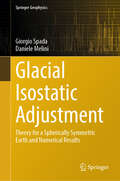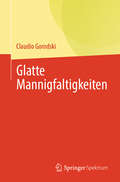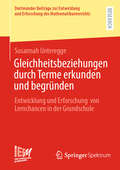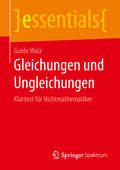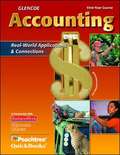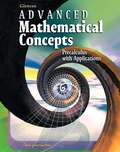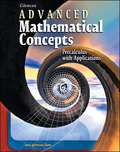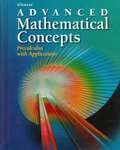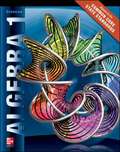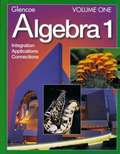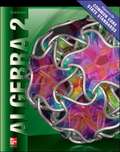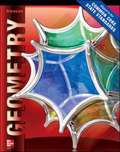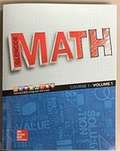- Table View
- List View
Give Me Half!
by G. Brian Karas Stuart J. MurphyHow do you share a pizza? You split it in half! Two siblings split a yummy lunch and discover that using fractions can be messy. This hilarious book written by Stuart J. Murphy and illustrated by G. Brian Karas introduces the simplest of fractions: 1/2. This is a Level 2 MathStart book, which is perfect for kids ages 6 and up. The MathStart series uses funny stories and colorful art to show kids that they use math every day, even outside of the classroom! Each book features an activity guide to have fun with the math concepts presented in the story. Supports the Common Core Learning Standards
Glacial Isostatic Adjustment: Theory for a Spherically Symmetric Earth and Numerical Results (Springer Geophysics)
by Giorgio Spada Daniele MeliniThis book aims at presenting a synthetic but self-contained theory of Glacial Isostatic Adjustment (GIA), firmly grounded on physics and mathematics. However, at the same time, it also describes various phenomenological aspects, making it appealing also to a broad audience of Earth scientists not having a technical background. The interest on GIA is motivated by the entangled processes involved, reflecting interactions between the solid Earth, the oceans, and the cryosphere. In the context of climate change, GIA has a special role. For example, ground or space-based geodetic methods aimed at observing the mass balance variations of the contemporary ice sheets require a GIA correction before they can be suitably interpreted. For these reasons, GIA modeling has seen a considerable development recently, with a growing attention by a broad audience of scientists in the fields of geophysics, geology, geodesy, and Earth system science.
Glatte Mannigfaltigkeiten
by Claudio GorodskiDieses prägnante und praxisorientierte Lehrbuch präsentiert die Grundlagen der Mathematik auf glatten Mannigfaltigkeiten. Glatte Mannigfaltigkeiten sind ein Schlüsselkonzept in der Mathematik und weit verbreitet: Sie treten auf als Riemannsche Mannigfaltigkeiten in der Differentialgeometrie; als Raum-Zeiten in der Allgemeinen Relativitätstheorie; als Phasenräume und Energieniveaus in der Mechanik; als Definitionsbereiche von gewöhnlichen Differentialgleichungen in dynamischen Systemen; als Lie-Gruppen in Algebra und Geometrie; und in vielen anderen Bereichen.Das Buch präsentiert zunächst die grundlegenden Begriffe und Sätze zu glatten Mannigfaltigkeiten und kulminiert mit dem Frobenius-Theorem, bevor es Tensoren auf Mannigfaltigkeiten behandelt (einschließlich einer Darstellung der äußeren Ableitung von Differentialformen).Es behandelt dann Lie-Gruppen und Lie-Algebren und geht kurz auf homogene Mannigfaltigkeiten ein.Integration auf Mannigfaltigkeiten, Erläuterungen des Stokes-Theorems und der de-Rham-Kohomologie sowie Grundlagen der Differentialtopologie vervollständigen dieses Werk. Es enthält auch Übungen im gesamten Text, um den Lesern zu helfen, die Theorie zu verstehen, sowie anspruchsvollere Probleme für diejenigen, die Herausforderungen mögen, am Ende jedes Kapitels. Konzipiert für einen einsemestrigen Kurs über differentielle Mannigfaltigkeiten und Lie-Gruppen, der von vielen Graduiertenprogrammen weltweit angeboten wird, ist es eine wertvolle Ressource für Studierende und Dozenten gleichermaßen.Die Übersetzung wurde mit Hilfe von künstlicher Intelligenz durchgeführt. Eine anschließende menschliche Überarbeitung erfolgte vor allem in Bezug auf den Inhalt.
Gleichheitsbeziehungen durch Terme erkunden und begründen: Entwicklung und Erforschung von Lernchancen in der Grundschule (Dortmunder Beiträge zur Entwicklung und Erforschung des Mathematikunterrichts #56)
by Susannah UntereggeDie Fokussierung auf mathematische Strukturen und Beziehungen ist zentral für die Entwicklung algebraischen Denkens. Ein umfassendes Verständnis von Gleichheitsbeziehungen im Mathematikunterricht stellt dafür eine wichtige Voraussetzung dar. Grundsätzlich sind unterschiedliche Sichtweisen auf arithmetische Gleichheiten möglich – je nachdem ob die Gleichwertigkeit zwischen Termen oder die strukturelle Beziehung zwischen ihnen betrachtet wird. Grundschulkinder richten ihren Fokus in diesem Zusammenhang häufig auf den Prozess des Berechnens, so dass die Gefahr einer einseitigen Sichtweise besteht. Wie ein Verständnis von Grundschulkindern im Hinblick auf Gleichheitsbeziehungen so flexibilisiert werden kann, dass unterschiedliche Sichtweisen eingenommen und vernetzt werden, ist von zentralem Interesse in dieser Studie. Untersucht wird daher zum einen, wie die Entwicklung eines umfassenden und flexiblen Verständnisses von Gleichheiten angeregt werden kann, und zum anderen, wie sich Deutungen der Kinder von Gleichheiten in ihren Begründungen zeigen und in der Interaktion verändern.
Gleichungen und Ungleichungen: Klartext Für Nichtmathematiker (Essentials)
by Guido WalzDas Buch vermittelt in leicht verständlicher Sprache die Grundlagen des Lösens von Gleichungen und Ungleichungen. Eines der Hauptthemen ist das Lösen von quadratischen Gleichungen, unabhängig davon, ob sie bereits in Normalform vorliegen oder erst in diese gebracht werden müssen. Als Instrument hierfür behandelt der Autor die p-q-Formel und die Mitternachtsformel. Daneben geht es um lineare Gleichungen sowie ganz allgemein um die Frage, welche Manipulationen man an einer Gleichung vornehmen darf, ohne ihre Lösungen zu ändern. Weiterhin werden die wichtigsten Ungleichungen behandelt und Strategien zu ihrer Lösung aufgezeigt.Der Autor Dr. Guido Walz ist Professor für Angewandte Mathematik an der Wilhelm-Büchner-Hochschule Darmstadt und Dozent an der Dualen Hochschule Baden-Württemberg, Herausgeber des fünfbändigen „Lexikon der Mathematik“ sowie Autor zahlreicher Fachveröffentlichungen und Lehrbücher, z.B. „Mathematik für Fachhochschule und duales Studium“.
Glencoe Accounting: Real-world Applications and Connections
by Robert Turner Donald Guerrieri F. Haber William HoytGlencoe Accounting: Real World Applications and Connections - First Year Course is the only accounting program with Peachtree fully integrated throughout. Glencoe is the only publisher to use real-world accounting software and companies to teach accounting!
Glencoe Advanced Mathematical Concepts Precalculus with Applications
by Berchie Holliday Gilbert J. Cuevas John A. Carter Melissa S. Mcclure Daniel MarksAdvanced Mathematical Concepts provides comprehensive coverage of all the topics covered in a full-year Precalculus course. Its unit organization readily allows for semester courses in Trigonometry, Discrete Mathematics, Analytic Geometry, and Algebra and Elementary Functions.
Glencoe Advanced Mathematical Concepts, Precalculus with Applications [Grade 11]
by Berchie Holliday Gilbert J. Cuevas Melissa S. Mcclure"Advanced Mathematical Concepts, (c)2006 provides comprehensive coverage of all the topics covered in a full-year Precalculus course. Its unique unit organization readily allows for semester courses in Trigonometry, Discrete Mathematics, Analytic Geometry, and Algebra and Elementary Functions. Pacing and Chapter Charts for Semester Courses are conveniently located on page T4 of the Teacher Wraparound Edition. <BR>"Advanced Mathematical Concepts lessons develop mathematics using numerous examples, real-world applications, and an engaging narrative. Graphs, diagrams, and illustrations are used throughout to help students visualize concepts. Directions clearly indicate which problems may require the use of a graphing calculator.
Glencoe Advanced Mathematical Concepts, Precalculus with Applications [Grade 11]
by Berchie Holliday Gilbert J. Cuevas Melissa S. McclureAdvanced Mathematical Concepts, ©2006 provides comprehensive coverage of all the topics covered in a full-year Precalculus course. Its unique unit organization readily allows for semester courses in Trigonometry, Discrete Mathematics, Analytic Geometry, and Algebra and Elementary Functions. Pacing and Chapter Charts for Semester Courses are conveniently located in the Teacher Wraparound Edition. Advanced Mathematical Conceptslessons develop mathematics using numerous examples, real-world applications, and an engaging narrative. Graphs, diagrams, and illustrations are used throughout to help students visualize concepts. Directions clearly indicate which problems may require the use of a graphing calculator.
Glencoe Advanced Mathematical Concepts: Precalculus with Applications
by Berchie W. Gordon-Holliday Lee E. Yunker F. Joe Crosswhite Glen D. VannattaThis textbook contains unit lessons on: Relations, Functions, and Graphs, Trigonometry, Advanced Functions and Graphing, Discrete Mathematics, and An Introduction to Calculus.
Glencoe Algebra 1
by Gilbert J. Cuevas Roger Day John A. CarterGlencoe High School Math Series is about connecting math content, rigor, and adaptive instruction for student success
Glencoe Algebra 1: Integration, Applications, Connections, Vol. 1
by Glencoe McGraw-Hill StaffWhy do I need to study algebra? When am I ever going to have to use algebra in the real world? Many people, not just algebra students, wonder why mathematics is important. Algebra 1 is designed to answer those questions through integration, applications, and connections. Did you know that algebra and geometry are closely related? Topics from all branches of mathematics, like geometry and statistics, are integrated throughout the text.
Glencoe Algebra 2: (Math Detective Pilot Test) (Merrill Algebra 2 Series)
by Gilbert J. Cuevas Roger Day John A. CarterNIMAC-sourced textbook
Glencoe California Math: Your Common Core Edition, CCSS, Course 1, Volume 2
by Day Carter CuevasNIMAC-sourced textbook
Glencoe California Math: Your Common Core Edition, CCSS, Course 2, Volume 1
by Day Carter CuevasNIMAC-sourced textbook
Glencoe California Math: Your Common Core Edition, CCSS, Course 2, Volume 2
by Day Carter CuevasNIMAC-sourced textbook
Glencoe California Math: Your Common Core Edition, CCSS, Volume 1
by Day Malloy Reynosa Silbey Vielhaber Carter Cuevas KersaintNIMAC-sourced textbook
Glencoe Georgia Math Grade 7 Volume 2
by Mcgraw-Hill EducationThis edition covers the following units: Unit 3: Ratios and Proportional Relationships Unit 4: Inferences Unit 5: Geometry Unit 6: Probability

